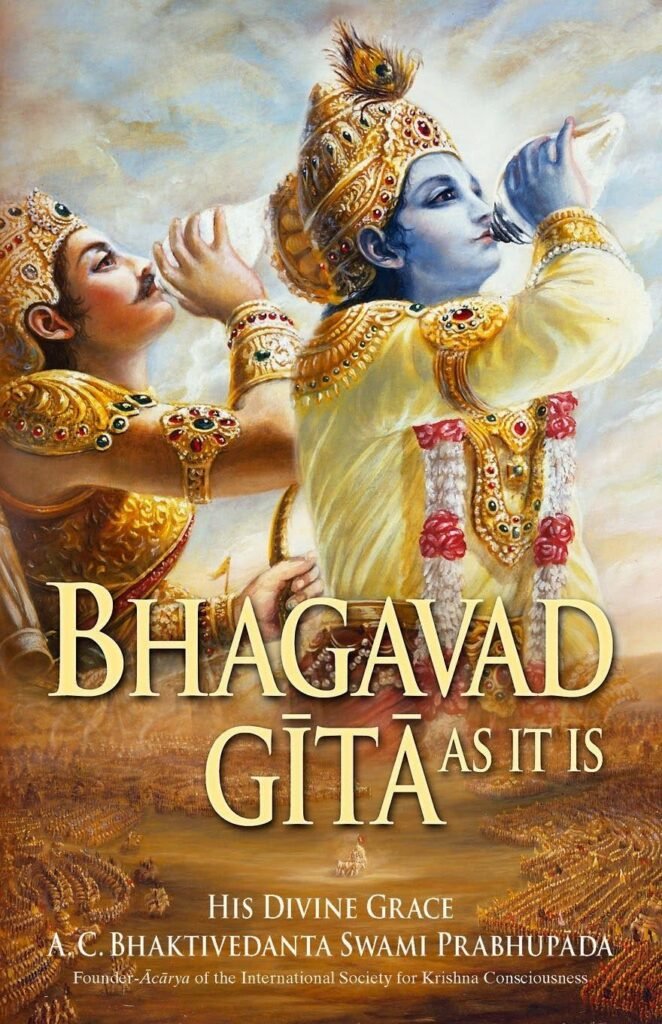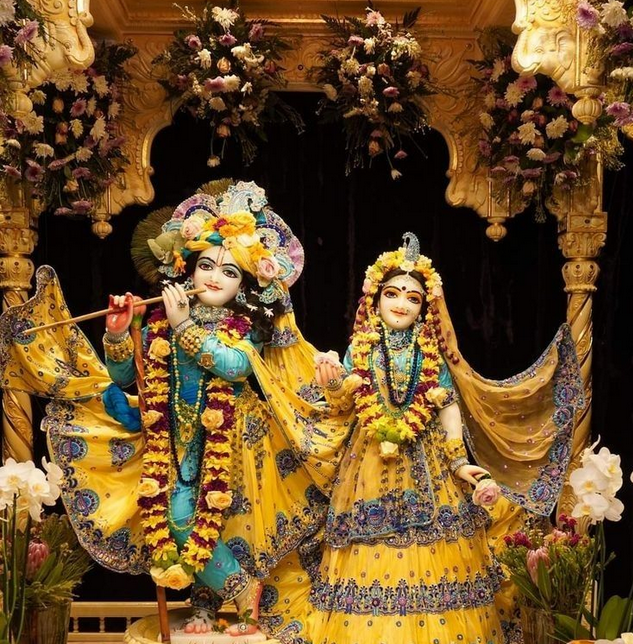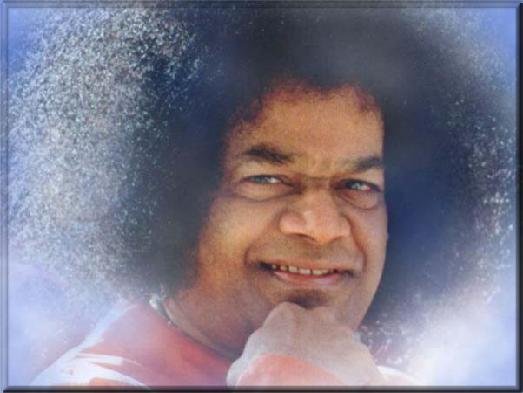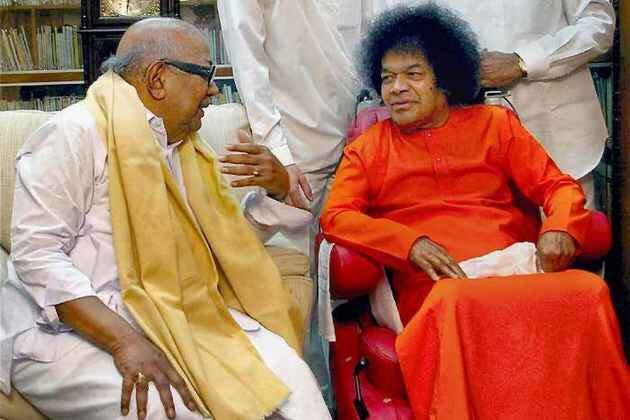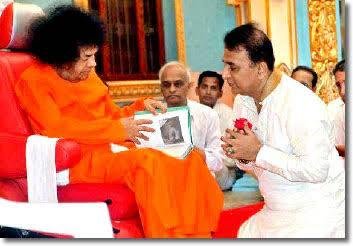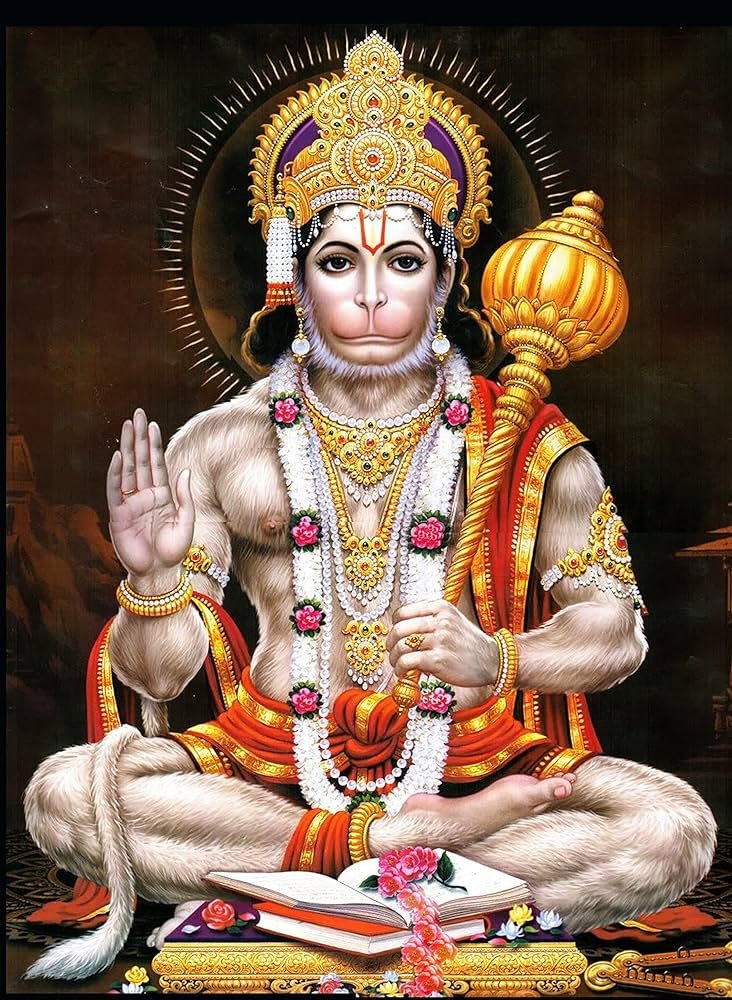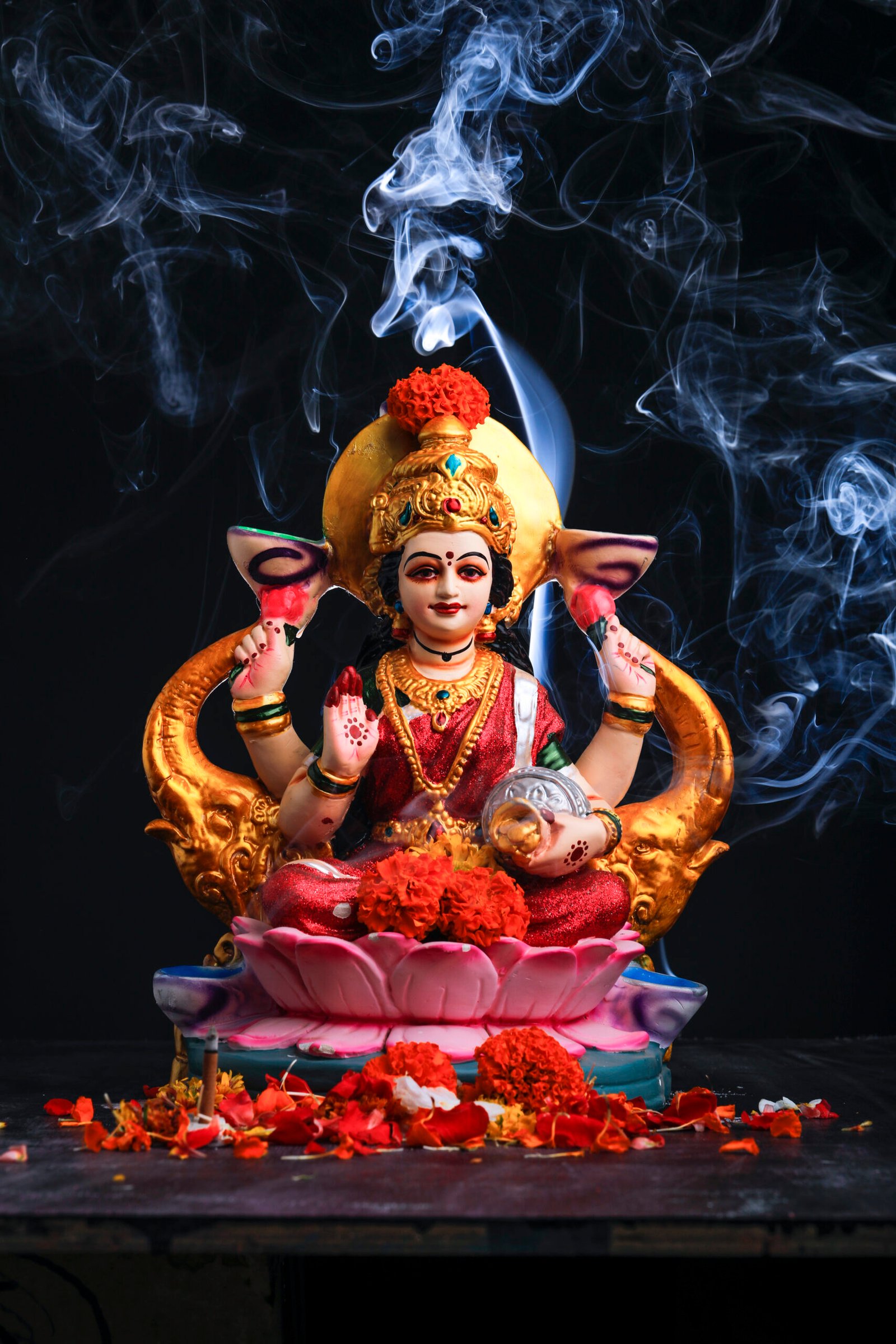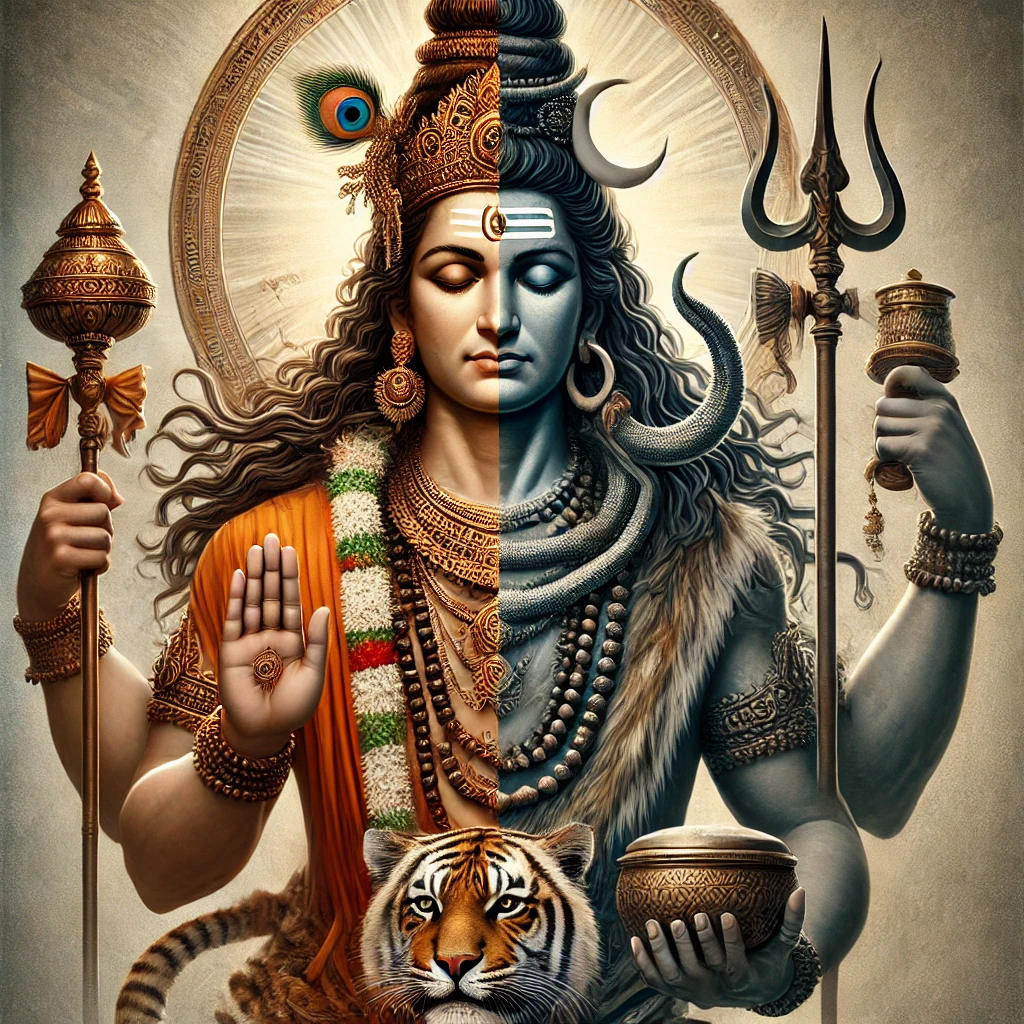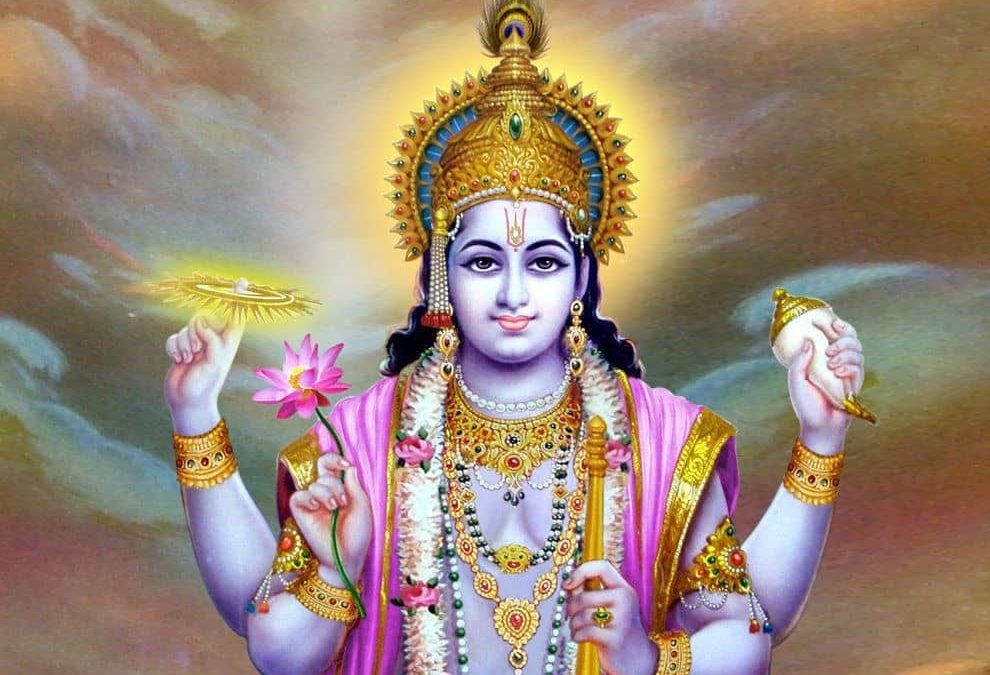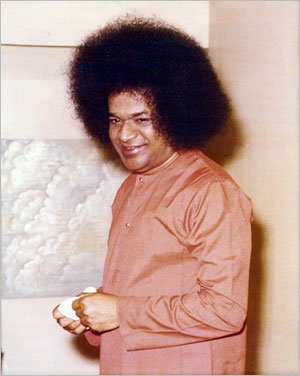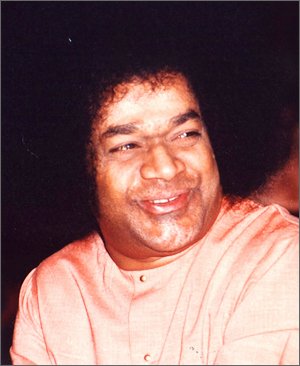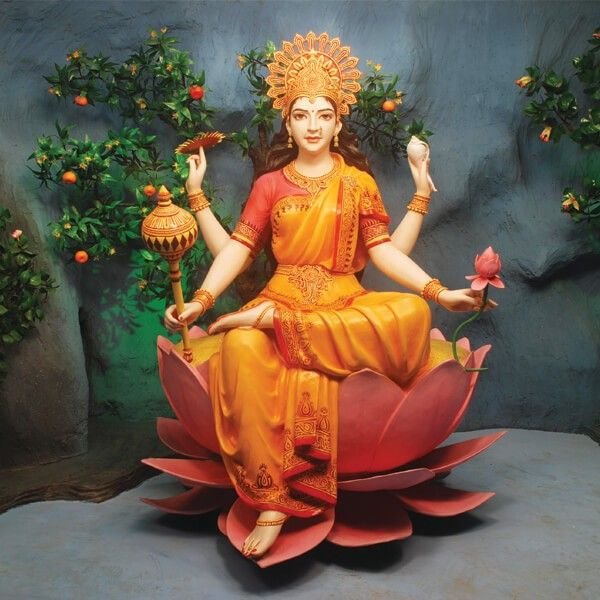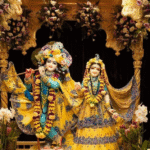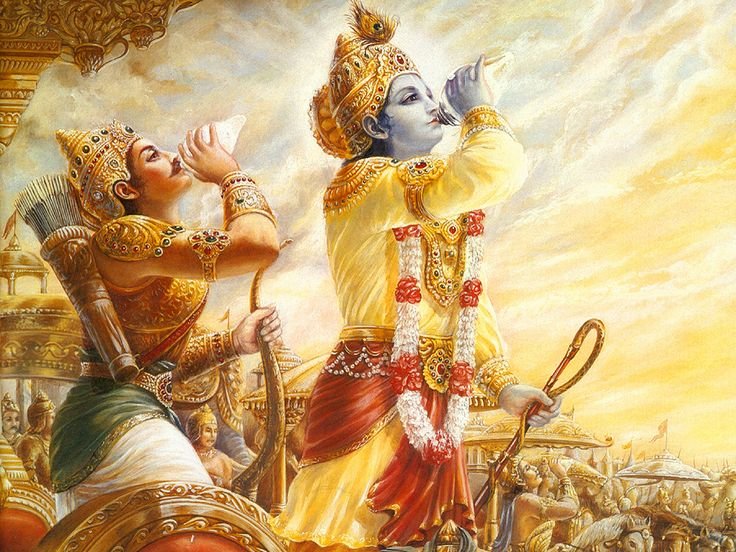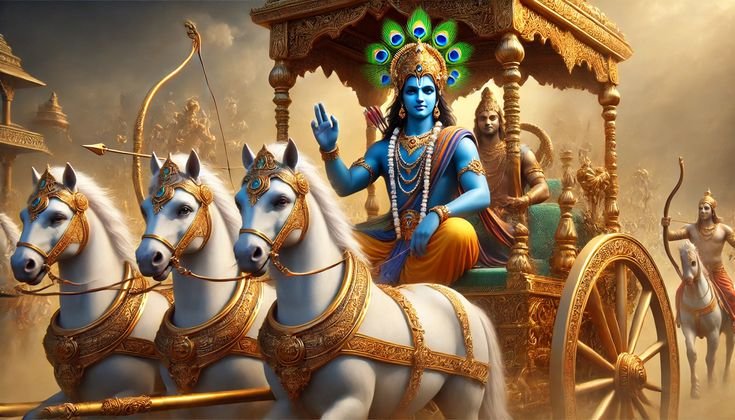Seventeen
Chapter 17
Sraddhatraya Vibhaga Yoga
The seventeenth chapter of the Bhagavad Gita is “Sraddhatraya Vibhaga Yoga”. In this chapter, Krishna describes the three types of faith corresponding to the three modes of the material nature. Lord Krishna further reveals that it is the nature of faith that determines the quality of life and the character of living entities. Those who have faith in passion and ignorance perform actions that yield temporary, material results while those who have faith in goodness perform actions in accordance with scriptural instructions and hence their hearts get further purified.
Bhagavad Gita 17.1
अर्जुन उवाचये शास्त्रविधिमुत्सृज्य यजन्ते श्रद्धयाऽन्विताः।तेषां निष्ठा तु का कृष्ण सत्त्वमाहो रजस्तमः।।17.1।।
arjuna uvācha ye śhāstra-vidhim utsṛijya yajante śhraddhayānvitāḥ teṣhāṁ niṣhṭhā tu kā kṛiṣhṇa sattvam āho rajas tamaḥ
arjunaḥ uvācha—Arjun said; ye—who; śhāstra-vidhim—scriptural injunctions; utsṛijya—disregard; yajante—worship; śhraddhayā-anvitāḥ—with faith; teṣhām—their; niṣhṭhā—faith; tu—indeed; kā—what; kṛiṣhṇa—Krishna; sattvam—mode of goodness; āho—or; rajaḥ—mode of passion; tamaḥ—mode of ignorance
Translation
Arjuna said, “What is the condition of those who, disregarding the injunctions of the scriptures, perform sacrifice with faith—is it Sattva, Rajas, or Tamas, O Krishna?”
Commentary
17.1 ये who? शास्त्रविधिम् the ordinances of the scriptures? उत्सृज्य setting aside? यजन्ते perform sacrifice? श्रद्धया with faith? अन्विताः endowed? तेषाम् their? निष्ठा condition? तु verily? का what? कृष्ण O Krishna? सत्त्वम् Sattva? आहो or? रजः Rajas? तमः Tamas.Commentary This chapter deals with the three kinds of people who are endowed with three kinds of faith. Each of them follows a path inaccordance with his inherent nature — either Sattvic? Rajasic or Tamasic.Arjuna says to Krishna It is very difficult to grasp the meaning of the scriptures. It is still more difficult to get a spiritual preceptor who can teach the scriptures. The vast majority of persons are not endowed with a pure? subtle? sharp and onepointed intellect. The span of life is short. The scriptures are endless. Theobstacles on the spiritual path are many. Facilities for learning are not always available.There are conflicting statements in the scriptures which have to be reconciled. Thou hast said that liberation is not possible without a knowledge of the scriptures. An ordinary man? though ignorant of or unable to follow this teaching? does charity? performs rituals? worships the Lord with faith? tries to follow.
the footsteps of sages and saints just as a child copies letters that have been written out for him as a model? or as a blind man makes hiw way by the aid of another who possesses sight. What faith is his How should the state of such a man be described — Sattvic? Rajasic or Tamasic What is the fate of the believers who have no knowledge of the scriptures
Bhagavad Gita 17.2
श्री भगवानुवाचत्रिविधा भवति श्रद्धा देहिनां सा स्वभावजा।सात्त्विकी राजसी चैव तामसी चेति तां श्रृणु।।17.2।।
śhrī-bhagavān uvācha tri-vidhā bhavati śhraddhā dehināṁ sā svabhāva-jā sāttvikī rājasī chaiva tāmasī cheti tāṁ śhṛiṇu
śhrī-bhagavān uvācha—the Supreme Personality said; tri-vidhā—of three kinds; bhavati—is; śhraddhā—faith; dehinām—embodied beings; sā—which; sva-bhāva-jā—born of one’s innate nature; sāttvikī—of the mode of goodness; rājasī—of the mode of passion; cha—and; eva—certainly; tāmasī—of the mode of ignorance; cha—and; iti—thus; tām—about this; śhṛiṇu—hear
Translation
The Blessed Lord said, “There are threefold faiths inherent in the nature of the embodied: the sattvic (pure), the rajasic (passionate), and the tamasic (dark). Hear of them.”
Commentary
17.2 त्रिविधा threefold? भवति is? श्रद्धा faith? देहिनाम् of the embodied? सा that (faith)? स्वभावजा (is) inherent in (their) nature? सात्त्विकी Sattvic (pure)? राजसी Rajasic (passionate)? च and? एव even? तामसी Tamasic (dark)? च and? इति thus? ताम् it? श्रृणु hear (thou).Commentary The whole world is made up? as if were? of faith. Faith assumes a threefold aspect under the influence of the three alities.
When Sattva is strongly developed? when there is a preponderance of Sattva or purity in a man? it is easy for him to attain Selfrealisation or the knowledge of the Self. If Rajas is predominant? the faith becomes the handmaid of activity. If Tamas or inertia prevails? faith is annihilated.Those who are endowed with Sattvic faith aim at the attainment of liberation..
Those who are endowed with Rajasic faith run after inferior duties or worldly activities. Those whose faith is Tamasic are cruel. They kill animals for sacrifice. They invoke the spirits and talk with ghosts. When faith is joined to Sattva? it leads to salvation. When Rajas preponderates? it colours the faith and leads to various activities. When Tamas predominates? the faith results in darkness.Faith acires different alities whenit is in company with the mind of man. Mind is a thing of many colours. Just as the water of the Ganga is contaminated by being put in a vessel where lior had been kept? so also a virtuous person is spoiled by bad company or constant association with evil persons. The three Gunas or attributes colour the faith of a man. The mind of a man is governed by the preponderating attribute or ality which manifests itself
Bhagavad Gita 17.3
सत्त्वानुरूपा सर्वस्य श्रद्धा भवति भारत। श्रद्धामयोऽयं पुरुषो यो यच्छ्रद्धः स एव सः।।17.3।।
sattvānurūpā sarvasya śhraddhā bhavati bhārata śhraddhā-mayo ‘yaṁ puruṣho yo yach-chhraddhaḥ sa eva saḥ
sattva-anurūpā—conforming to the nature of one’s mind; sarvasya—all; śhraddhā—faith; bhavati—is; bhārata—Arjun, the scion of Bharat; śhraddhāmayaḥ—possessing faith; ayam—that; puruṣhaḥ—human being; yaḥ—who; yat-śhraddhaḥ—whatever the nature of their faith; saḥ—their; eva—verily; saḥ—they
Translation
The faith of each is in accordance with their nature, O Arjuna. People consist of their faith; as a person’s faith is, so are they.
Commentary
17.3 सत्त्वानुरूपा in accordance with his nature? सर्वस्य of each? श्रद्धा faith? भवति is? भारत O Arjuna? श्रद्धामयः consists of (his) faith? अयम् this? पुरुषः man? यः who? यच्छ्रद्धः in which his faith is? सः he? एव verily? सः that (is).Commentary The faith of every person conforms to his inherent nature or natural temperament. Man is imbued with faith.
The term Svabhava is the last verse and the word Sattva in the present one are synonymous.A mans character may be judged by his faith. A mans faith shows what his character is. A man is what his faith has made him. A mans conduct in life is moulded or shaped by his faith. His faith will indicate his Nishtha (state of being? conviction). The faith of each man is according to his natural disposition or the specific tendencies or Samskaras.
the selfreprodutive latent impressions of the good and bad actions which were performed in the past births. The faith of each man takes its colour and ality from the stuff of his being? his temperament? tendencies or Samskaras.Sattva Nature Natural disposition the mind with its specific tendencies.Each Every living being.Purusha Man The individual soul which is caught up in the wheel of transmigration.
the soul alified by mind.Sraddhamayah Full of faith Just as the Annamaya Kosa is full of food? just as the Anandamaya Kosa is full of bliss? so also the Antahkarana (mind? intellect? etc.) is full of faith.The man consists of his faith that which his faith is? he is verily that. This theory is only a repetition of the theory propounded in chapter VII? verses 20 and 23? and in chapter IX? verse 25.
Bhagavad Gita 17.4
यजन्ते सात्त्विका देवान्यक्षरक्षांसि राजसाः। प्रेतान्भूतगणांश्चान्ये यजन्ते तामसा जनाः।।17.4।।
yajante sāttvikā devān yakṣha-rakṣhānsi rājasāḥ pretān bhūta-gaṇānśh chānye yajante tāmasā janāḥ
yajante—worship; sāttvikāḥ—those in the mode of goodness; devān—celestial gods; yakṣha—semi-celestial beings who exude power and wealth; rakṣhānsi—powerful beings who embody sensual enjoyment, revenge, and wrath; rājasāḥ—those in the mode of passion; pretān-bhūta-gaṇān—ghosts and spirits; cha—and; anye—others; yajante—worship; tāmasāḥ—those in the mode of ignorance; janāḥ—persons
Translation
The sattvic, or pure, men worship the gods; the rajasic, or passionate, worship the yakshas and rakshasas; the others, the tamasic or deluded people, worship ghosts and hosts of nature-spirits.
Commentary
17.4 यजन्ते worship? सात्त्विकाः the Sattvic or pure men? देवान् the gods? यक्षरक्षांसि the Yakshas and the Rakshasas? राजसाः the Rajasic or the passionate? प्रेतान् ghosts? भूतगणान् the hosts of Bhutas or the naturespirits? च and? अन्ये the others? यजन्ते worship? तामसाः the Tamasic? जनाः people.Commentary Lord Krishna? after defining faith? tells Arjuna how this faith determines the object of worship.
The nature of the faith (whether it is Sattvic? Rajasic or Tamasic) has to be inferred from its characteristic effects? viz.? the worship of the gods and the like. Each man selects his object of worship according to the ruling Guna of his being. The expression of a mans faith depends on the Guna that is predominant in him. A Sattvic man will give his faith the Sattvic expression?
A Rajasic man the Rajasic expression and a Tamasic man the Tamasic expression.Sattvic persons or people with Sattvic faith who are devoted to the worship of the gods? are rare in this world.Yakshas are the brothers of Kubera? the lord of wealth gnomes? the spirits that guard wealth.Rakshasas Beings of strength and power such as Nairrita demons giants gifted with illusive powers.Bhutas Ghosts.
Bhagavad Gita 17.5
अशास्त्रविहितं घोरं तप्यन्ते ये तपो जनाः। दम्भाहङ्कारसंयुक्ताः कामरागबलान्विताः।।17.5।।
aśhāstra-vihitaṁ ghoraṁ tapyante ye tapo janāḥ dambhāhankāra-sanyuktāḥ kāma-rāga-balānvitāḥ
aśhāstra-vihitam—not enjoined by the scriptures; ghoram—stern; tapyante—perform; ye—who; tapaḥ—austerities; janāḥ—people; dambha—hypocrisy; ahankāra—egotism; sanyuktāḥ—possessed of; kāma—desire; rāga—attachment; bala—force; anvitāḥ—impelled by;
Translation
Those men who practice terrific austerities not prescribed by the scriptures, given to hypocrisy and egoism, driven by the force of lust and attachment.
Commentary
17.5 अशास्त्रविहितम् not enjoined by the scriptures? घोरम् terrific? तप्यन्ते practise? ये who? तपः austerity? जनाः men? दम्भाहङ्कारसंयुक्ताः given to hypocrisy and egoism? कामरागबलान्विताः by the force of lust and attachment.Commentary There are some who think that the mortification of the body is the proper means to attain the goal of life. They do this in order to attract the people and get money for the gratification of their senses. They stand on one leg with raised hands. This is not real Tapas. This is Tamasic Tapas. Bodily torture will not bring emancipation. These men are not acainted with even the first elements of the scriptures. They mock at the religious practices of the wise? elderly persons and jeer at learned men. They are puffed up with the vanity of their own greatness.
They are proud of their wealth. They perform unauthorised austerities. These persons do severe austerities contrary to the scriptures on the strength of desire and attachment.They take even the lives of children to propitiate their deity. Instead of killing their egoism? they kill many innocent animals in the name of sacrifice but in reality they kill them to satisfy their own palate. Most horrible indeedThey speak ill of the scriptures and wander about in the forest of delusion and infatuation. They follow the dictates of passion. They inflict pain on themselves and on others. They practise austerities which cause pain to themselves and to other living beings. Pitiable indeed is their lot. They are doomed to destruction.Kamaragabalanvitah may also be interpreted as possessed of lust? attachment and power.
Dambha Ostentation The man of Dambha is desirous that all people should take him for a virtuous man and so he expresses to others his righteous nature. In reality he is not virtuous. He pretends to be what he is not.Ahankara Egoism The egoistic man thinks and feels that he is superior to others in the possession of all virtuous alities.Raga Extreme attachment to sensual objects.Bala Great powerand preserving the objects).Kama Lust Desire for any object.

Bhagavad Gita 17.6
कर्षयन्तः शरीरस्थं भूतग्राममचेतसः। मां चैवान्तःशरीरस्थं तान्विद्ध्यासुरनिश्चयान्।।17.6।।
karṣhayantaḥ śharīra-sthaṁ bhūta-grāmam achetasaḥ māṁ chaivāntaḥ śharīra-sthaṁ tān viddhy āsura-niśhchayān
karṣhayantaḥ—torment; śharīra-stham—within the body; bhūta-grāmam—elements of the body; achetasaḥ—senseless; mām—me; cha—and; eva—even; antaḥ—within; śharīra-stham—dwelling in the body; tān—them; viddhi—know; āsura-niśhchayān—of demoniacal resolves
Translation
Know thou these to be of demonical resolves, senselessly torturing all the elements in the body and Me who dwell in the body.
Commentary
17.6 कर्षयन्तः torturing? शरीरस्थम् dwelling in the body? भूतग्रामम् all the elements? अचेतसः senseless? माम् Me? च and? एव even? अन्तःशरीरस्थम् who dwells in the body within? तान् them? विद्धि know? आसुरनिश्चयान् to be of demoniac resolves.Commentary Bhutagramam The aggregate of all the elements composing the body.Elements Organs.Mam Me Vaasudeva? the witness of their thoughts and deeds.He who thus tortures Me disregards My teachings entirely.Achetasah Senseless? unintelligent? having no discrimination.
Bhagavad Gita 17.7
आहारस्त्वपि सर्वस्य त्रिविधो भवति प्रियः। यज्ञस्तपस्तथा दानं तेषां भेदमिमं श्रृणु।।17.7।।
āhāras tv api sarvasya tri-vidho bhavati priyaḥ yajñas tapas tathā dānaṁ teṣhāṁ bhedam imaṁ śhṛiṇu
āhāraḥ—food; tu—indeed; api—even; sarvasya—of all; tri-vidhaḥ—of three kinds; bhavati—is; priyaḥ—dear; yajñaḥ—sacrifice; tapaḥ—austerity; tathā—and; dānam—charity; teṣhām—of them; bhedam—distinctions; imam—this; śhṛiṇu—hear
Translation
The food that is dear to each is threefold, as well as sacrifice, austerity, and almsgiving. Hear the distinction of these.
Commentary
17.7 आहारः food? तु indeed? अपि also? सर्वस्य of all? त्रिविधः threefold? भवति is? प्रियः dear? यज्ञः sacrifice? तपः austerity? तथा also? दानम् almsgiving? तेषाम् their? भेदम् distinction? इमम् this? श्रृणु hear.Commentary Each Every being that eats.Imam This That which is going to be described.Tesham Their Of food? etc.According to the Gunas? a mans taste for a particular food is determined.
there are three kinds of food that a man can eat.All foods have different properties. Different foods exercise different effects on different compartments of the brain or the mind. A confection of sparrow? meat? fish? eggs? onion and garlic excites passion. Fruits? barley? etc.? render the mind calm and serene. The nature of food greatly influences the being of a man. Man feels a desire for particular foodsaccording to his Guna or temperament.The body is the instrument by which man accomplishes all his purposes in the world. It is the horse that takes him to his destination or goal (Moksha). Therefore it should be kept clean? strong and healthy. The body is a mould prepared by the mind for its activities. There is an intimate connection between the body and the mind.
The nature and condition of the body has a vital effect upon the mind and activities. Therefore the materials or foods that build the body and the mind should be pure? wholesome? nutritious? substantial and bland.Everything in this world is threefold. The food is either Sattvic? Rajasic or Tamasic according to its,character and effect upon the body and the mind. You can find out the nature or temperament of a man from the natureof the food he takes. You can find out your own nature? whether you are Sattvic? Rajasic or Tamasic? from your predilection to particular food and then abandon the Rajasic and the Tamasic foodstuffs and take to the Sattvic diet.Why is there also a triple division in sacrifice? austerity and charity Because this threefold division is according to the nature of the Gunas. You can find out and abandon
Bhagavad Gita 17.8
आयुःसत्त्वबलारोग्यसुखप्रीतिविवर्धनाः।रस्याः स्निग्धाः स्थिरा हृद्या आहाराः सात्त्विकप्रियाः।।17.8।।
āyuḥ-sattva-balārogya-sukha-prīti-vivardhanāḥ rasyāḥ snigdhāḥ sthirā hṛidyā āhārāḥ sāttvika-priyāḥ
āyuḥ sattva—which promote longevity; bala—strength; ārogya—health; sukha—happiness; prīti—satisfaction; vivardhanāḥ—increase; rasyāḥ—juicy; snigdhāḥ—succulent; sthirāḥ—nourishing; hṛidyāḥ—pleasing to the heart; āhārāḥ—food; sāttvika-priyāḥ—dear to those in the mode of goodness
Translation
The foods that increase life, purity, strength, health, joy, and cheerfulness (good appetite), which are savory, oily, substantial, and agreeable, are dear to the Sattvic (pure) people.
Commentary
17.8 आयुःसत्त्वबलारोग्यसुखप्रीतिविवर्धनाः those which increase Ayus (life)? Sattva (purity)? Bala (strength)? Arogya (health)? Sukha (joy)? Priti (cheerfulness and good appetite)? रस्याः savoury? स्निग्धाः oleaginous? स्थिराः substantial? हृद्याः agreeable? आहाराः the foods? सात्त्विकप्रियाः are dear to Sattvic (pure).Commentary Pure food increases the vitality and strength of those who eat it. it augments the energy of the mind also.Sattva Cheerfulness purity inner? moral and spiritual strength and courage that keep the mind steady even in great distress.Bala Strength absence of fatigue even in doing difficult work.Priti Absence of retching good appetite.Rasyah Sweet and juicy.Sthirah Substantial which can last long in the body vitalising but not difficult to digest.Hridyah The mere sightof the food is very pleasing to the mind and it is free from odour of smoke or burnt condition.Sattvic food produces cheerfulness? serenity and mental clarity and helps the aspirants to enter into deep meditation and maintain mental poise and nervous eilibrium. It supplies the maximum energy to the body and the mind. It is very easily assimilated and absorbed.A Sattvic man relishes juicy food and other foods which are attractive in form? soft to touch and pleasant to taste? which are small in bulk but great in nourishment like the words from the lips of a spiritual preceptor. Sattvic food is highly conducive to health.Eat that food which will develop Sattva in you. Milk? butter? fresh? ripe fruits? almonds? green Dal? barley? Parwal? Torai? Karela? plantains? etc.? are Sattvic. Abandon fish? meat? liors? eggs? etc.? ruthlessly if you want to increase Sattva and attain Selfrealisation. The mind is formed of the subtle portion of the food. जैसा अन्न वैसा मन As is the food so is the mind says a Hindi proverb. If you take Sattvic food? the mind also will be Sattvic. The seven elements (Dhatus) of the body (Chyle? blood? flesh? fat? bone? marrow and semen) are formed out of food.Ideas or conceptsare generated in the mind corresponding to these seven elements. As is the constitution of these elements? so is the constitution of the mind. Just as water is rendered hot when the pot thatcontains it is placed over the fire? so also the nature and constitution of the mind is according to the nature and constitution of the food or the seven elements.
Bhagavad Gita 17.9
कट्वम्ललवणात्युष्णतीक्ष्णरूक्षविदाहिनः।आहारा राजसस्येष्टा दुःखशोकामयप्रदाः।।17.9।।
kaṭv-amla-lavaṇāty-uṣhṇa- tīkṣhṇa-rūkṣha-vidāhinaḥ āhārā rājasasyeṣhṭā duḥkha-śhokāmaya-pradāḥ
kaṭu—bitter; amla—sour; lavaṇa—salty; ati-uṣhṇa—very hot; tīkṣhṇa—pungent; rūkṣha—dry; vidāhinaḥ—chiliful; āhārāḥ—food; rājasasya—to persons in the mode of passion; iṣhṭāḥ—dear; duḥkha—pain; śhoka—grief; āmaya—disease; pradāḥ—produce
Translation
The foods that are bitter, sour, salty, overly hot, pungent, dry, and burning are liked by the Rajasic and are productive of pain, grief, and disease.
Commentary
17.9 कट्वम्ललवणात्युष्णतीक्ष्णरूक्षविदाहिनः those that are bitter? sour saline? excessively hot? pungent? dry and burning? आहाराः foods? राजसस्य of the Rajasic? इष्टाः are liked? दुःखशोकामयप्रदाः are productive of pain? grief and disease.Commentary Excessively This alification should be taken to apply to each of the seven alities — thus? excessively saline? and so on.Food of a passionate nature produces restlessness in the mind? evil thoughts? excitement? craving now for one thing and then for another? pain? trouble and disease. The Rajasic man always plans to prepare various kinds of preparations to satisfy his palate. He takes salt? chillies? mustard? cloves? condiments? pungent pickles? etc.? in excess. Tears flow from his eyes and water dribbles from his nose and yet he will not leave the hotand pungent articles. The palate remains unsatisfied until the stomach is completely filled with pungent things? till the tongue is burnt with chillies. Ladysfinger? Puri? Kachori? pungent condiments? meat? fish? eggs? sweets? potato? fried bread? curd? brinjal? carrots? blackgram? onions? garlic? lemon? Masur? tea? coffee? betels? tobacco are Rajasic artciles of food.
Bhagavad Gita 17.10
यातयामं गतरसं पूति पर्युषितं च यत्।उच्छिष्टमपि चामेध्यं भोजनं तामसप्रियम्।।17.10।।
yāta-yāmaṁ gata-rasaṁ pūti paryuṣhitaṁ cha yat uchchhiṣhṭam api chāmedhyaṁ bhojanaṁ tāmasa-priyam
yāta-yāmam—stale foods; gata-rasam—tasteless; pūti—putrid; paryuṣhitam—polluted; cha—and; yat—which; uchchhiṣhṭam—left over; api—also; cha—and; amedhyam—impure; bhojanam—foods; tāmasa—to persons in the mode of ignorance; priyam—dear
Translation
That which is stale, tasteless, putrid, rotten, rejected, and impure is the food liked by the Tamasic.
Commentary
17.10 यातयामम् state? गतरसम् tasteless? पूति putrid? पर्युषितम् rotten? च and? यत् which? उच्छिष्टम् refuse? अपि also? च and? अमेध्यम् impure? भोजनम् food? तामसप्रियम् liked by the Tamasic.Commentary Cannabis indica (Ganja)? Bhang? opium? cocaine? Charas? Chandoo? all stale and putrid articles? are Tamasic.Yatayamam Stale? literally means cooked three hours ago. Yatayamam and Gatarasam mean the same thing. Paryushitam Rotten The cooked food which has been kept overnight.Uchchishtam What is left on the plate after a meal.The man whose taste is of a Tamasic nature will eat food in the afternoon that has been cooked on the previous day. He also likes that which is halfcooked or burnt to a cinder. He and all the members of his family sit together and eat from the same dish or plate? food that hasbeen mixed into a mess by his children.The food eaten by Tamasic people is stale? dry? without juice? unripe or overcooked. They do not relish it? till it begins to rot and ferment. They take prohibited foods and drinks. They take liors? fermented toddy? etc. They are horrible people with devilish tendencies.
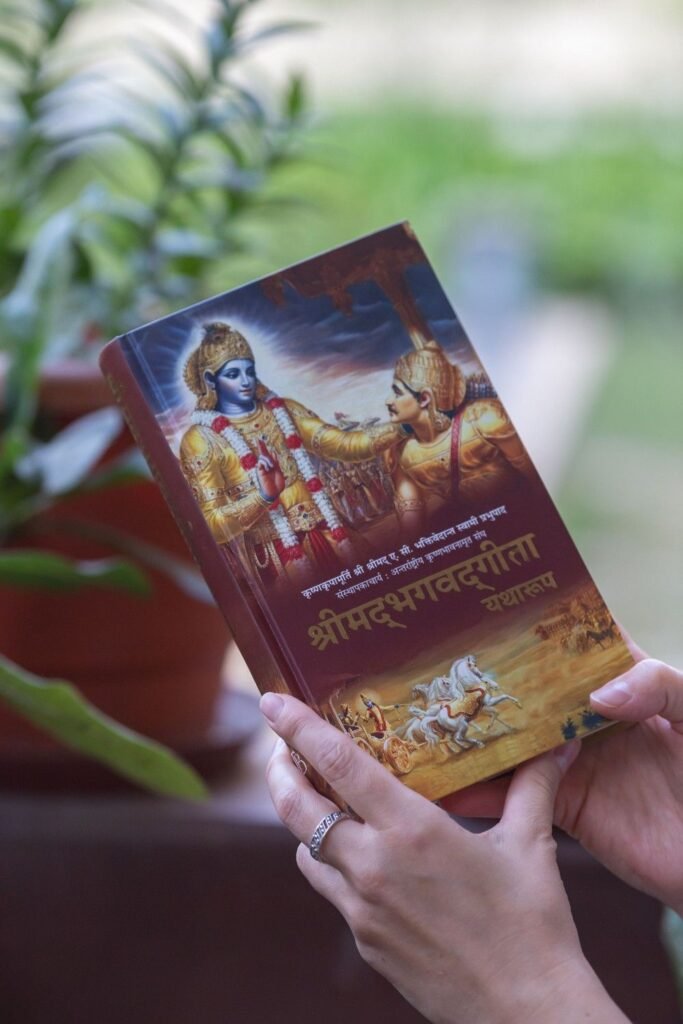
Bhagavad Gita 17.11
अफलाकाङ्क्षिभिर्यज्ञो विधिदृष्टो य इज्यते।यष्टव्यमेवेति मनः समाधाय स सात्त्विकः।।17.11।।
aphalākāṅkṣhibhir yajño vidhi-driṣhṭo ya ijyate yaṣhṭavyam eveti manaḥ samādhāya sa sāttvikaḥ
aphala-ākāṅkṣhibhiḥ—without expectation of any reward; yajñaḥ—sacrifice; vidhi-driṣhṭaḥ—that is in accordance with the scriptural injunctions; yaḥ—which; ijyate—is performed; yaṣhṭavyam-eva-iti—ought to be offered; manaḥ—mind; samādhāya—with conviction; saḥ—that; sāttvikaḥ—of the nature of goodness
Translation
That sacrifice which is offered by men without desire for reward, as enjoined by the ordinance (scripture), with a firm faith that doing so is their duty, is Sattvic or pure.
Commentary
17.11 अफलाकाङ्क्षिभिः by men desiring no fruit? यज्ञः sacrifice? विधिदृष्टः as enjoined by the ordinance? यः which? इज्यते is offered? यष्टव्यम् ought to be offered? एव only? इति thus? मनः the mind? समाधाय having fixed? सः that? सात्त्विकः Sattvic or pure.Commentary When a sacrifice is done with all due Sattvic rites? faith and devotion? without the least taint of desire for reward? with the mindfixed on the sacrifice only? for its own sake (for the,sake of discharging the duty only)? then it is said to be pure in its nature. Here the sacrifice is done in a disinterested spirit or with an attitude of desirelessness (Nishkamya Bhava) as an auxiliary to the attainment of the knowledge of the Self. Such selfless and desireless actions purify the mind and prepare the aspirant for the reception divine light or knowledge of the Self. The Sattvic nature of a man forces him to do such selfless and desireless sacrifices. He does not care even for his own emancipation. He performs them with the firm belief that they ought to be done. He does them with the firm resolve that sacrifice is a duty.Yajna here is not limited to the ceremonial sacrifice. It is used in a broad sense. Any unselfish action done without attachment? without agency or egoism and without expectation of reward? as an offering unto the Lord? is a Yajna or sacrifice.
Bhagavad Gita 17.12
अभिसंधाय तु फलं दम्भार्थमपि चैव यत्।इज्यते भरतश्रेष्ठ तं यज्ञं विद्धि राजसम्।।17.12।।
abhisandhāya tu phalaṁ dambhārtham api chaiva yat ijyate bharata-śhreṣhṭha taṁ yajñaṁ viddhi rājasam
abhisandhāya—motivated by; tu—but; phalam—the result; dambha—pride; artham—for the sake of; api—also; cha—and; eva—certainly; yat—that which; ijyate—is performed; bharata-śhreṣhṭha—Arjun, the best of the Bharatas; tam—that; yajñam—sacrifice; viddhi—know; rājasam—in the mode of passion
Translation
The sacrifice that is offered, O Arjuna, seeking a reward and for show, know that to be a Rajasic Yajna.
Commentary
17.12 अभिसंधाय seeking for? तु indeed? फलम् fruit? दम्भार्थम् for ostentation? अपि also? च and? एव even? यत् which? इज्यते is offered? भरतश्रेष्ठ O best of the Bharatas? तम् that? यज्ञम् sacrifice? विद्धि know? राजसम् Rajasic.Commentary If anyone performs a sacrifice in order to obtain? heaven? son? wealth? or name and fame? then it is a sacrifice of a Rajasic nature. The performer of this kind ofsacrifice has the motive of increasing his own importance? for popularising his own name in the world? for gaining some reward? for showing himself off as a great? pious and learned man? for making an exhibition of his riches for his own glorificaion. He has no aspiration for attaining the knowledge of the Self.
Bhagavad Gita 17.13
विधिहीनमसृष्टान्नं मन्त्रहीनमदक्षिणम्।श्रद्धाविरहितं यज्ञं तामसं परिचक्षते।।17.13।।
vidhi-hīnam asṛiṣhṭānnaṁ mantra-hīnam adakṣhiṇam śhraddhā-virahitaṁ yajñaṁ tāmasaṁ parichakṣhate
vidhi-hīnam—without scriptural direction; asṛiṣhṭa-annam—without distribution of prasādam; mantra-hīnam—with no chanting of the Vedic hymns; adakṣhiṇam—with no remunerations to the priests; śhraddhā—faith; virahitam—without; yajñam—sacrifice; tāmasam—in the mode of ignorance; parichakṣhate—is to be considered
Translation
They declare that sacrifice to be Tamasic which is contrary to the ordinances of the scriptures, in which no food is distributed, and which is devoid of mantras, gifts, and faith.
Commentary
17.13 विधिहीनम् without keeping to ordinance? असृष्टान्नम् in which no food is distributed? मन्त्रहीनम् which is devoid of Mantras? अदक्षिणम् which is devoid of gifts? श्रद्धाविरहितम् which is devoid of faith? यज्ञम् sacrifice? तामसम् Tamasic? परिचक्षते (they) declare.Commentary A sacrifice performed by a Tamasic man is never guided by any consideration for the prescribed rites or incantation.
You will find every irregularity in this sacrifice. No food is distributed. No fees which are prescribed in the scriptures are given to the priests. The Mantras are not changed properly. The hymns recited are defective in utterance and accent. Sometimes there is no recitation at all. There is no faith. A man who performs such a sacrifice does not get any merit.
Bhagavad Gita 17.14
देवद्विजगुरुप्राज्ञपूजनं शौचमार्जवम्।ब्रह्मचर्यमहिंसा च शारीरं तप उच्यते।।17.14।।
deva-dwija-guru-prājña- pūjanaṁ śhaucham ārjavam brahmacharyam ahinsā cha śhārīraṁ tapa uchyate
deva—the Supreme Lord; dwija—the Brahmins; guru—the spiritual master; prājña—the elders; pūjanam—worship; śhaucham—cleanliness; ārjavam—simplicity; brahmacharyam—celibacy; ahinsā—non-violence; cha—and; śhārīram—of the body; tapaḥ—austerity; uchyate—is declared as
Translation
Worship of the gods, the twice-born, the teachers, and the wise; purity, straightforwardness, celibacy, and non-injury are all called the austerities of the body.
Commentary
17.14 देवद्विजगुरुप्राज्ञपूजनम् worship of the gods? the twicorn? the teachers and the wise? शौचम् purity? आर्जवम् straightforwardness? ब्रह्मचर्यम् celibacy? अहिंसा noninjury? च and? शारीरम् of the body? तपः austerity? उच्यते is called.Commentary Tapas Austerity or selfdiscipline.Using the feet in pilgrimage to the sacred temples using the hands in cleaning the temples? in collecting the materials of worship of God? and in performing worship prostrations to the Brahmanas? preceptors and the wise continence and noninjury? constitute physical austerity. The body is used in the service of the parents and preceptors? the poor and the sick. This is also bodily austerity. That austerity which is done by the body is physical austerity. The physical body is the chief agent in doing such austerity. Hence this is called physical austerity. The practice of nonstealing and noncovetousness are also included in physical austerity.He who has realised I am Brahman is a wise man (Prajna). A Sudra also may be a wise man. Though Vidura was a Sudra he was a sage. That is the reason why the Lord has made a separate mention of the wise.Brahmacharya means control but not suppression of the sexdesire or sexforce.
If the mind is filled with sublime thoughts by meditation? Japa (repetition of a Mantra)? prayer? study of holy scriptures? eniry of Who am I? and contemplation of the sexless? pure Self? the sexdesire will be devitalised by the withdrawal of the mind. The mind also will be thinned out. Suppressed sexdesire will attack you again and again and will produce wetdreams? irritability and restlessness ofthe mind. The mind should be rendered pure by meditation? Japa? singing of the Lords names? and prayer. The mind should be controlled first. Then it will be easy for you to control the senses. That is the reason why the practice of Sama or the control of the mind comes first and then comes Dama or the restraint of the senses (in the order of the sixfold virtues. The senses cannot operate without the help of the mind. So the effective remedy for lust and the best aid to celibacy is to control the mind first and then the senses.Intense musing on the objects of the senses does more harm to the inner spiritual life than actual sensegratification. If the mind is not rendered pure by Sadhana? mere mortification of the external senses will not produce the desired effect. Although the external senses are mortified? their internal counterparts which are still energetic and vigorous? revenge upon the mind? and produce intense mental disturbance and wild imagination.To control the mind is diffcult for neophytes or the beginners. It will be extremely difficult to control the mind first when the senses are allowed to run riot. That is the reason why Lord Krishna says Therefore? O Arjuna?
first the senses? do thou slay this thing of sin (desire)? destructive of wisdom and knowledge. (Cf.III.41)The theory or doctrine that the mind should be controlled first is ite correct. This practice is intended for the firstclass type of spiritual aspirants. The middling type of students should control the senses first. The senses always have an outgoing tendency. The mind operates through the senses. Control of the one goes hand in hand with control of the other. Control of the senses is also control of the mind? because the mind is a bundle of senses only there is no mind without the senses.Just as an enemy can be easily conered if you have a twopronged attack? so also the mind can be controlled easily if you attack it on two fronts simultaneously — an external attack on the senses and an internal attack on the mind itself by the eradication of the desires.To say? Control the mind first? you can control the senses (which is one point of view) or Control the senses first? you can control the mind easily (which is another point of view) is simply arguing in a vicious circle like Which came first — the tree or the seed or You will get the knowledge of the Self if you control all desires you can control all the desires only if you have knowledge of the Self.You need not worry yourself over this seeming paradox. Try to do either of the practices? viz.? control of the mind or control of the senses? according to your liking? capacity? taste and temperament. You can yourself find out by actual practice which is better. As you advance in your practice your doubtwill gradually disapperar and you will enjoy supreme peace and joy.

Bhagavad Gita 17.15
अनुद्वेगकरं वाक्यं सत्यं प्रियहितं च यत्।स्वाध्यायाभ्यसनं चैव वाङ्मयं तप उच्यते।।17.15।।
anudvega-karaṁ vākyaṁ satyaṁ priya-hitaṁ cha yat svādhyāyābhyasanaṁ chaiva vāṅ-mayaṁ tapa uchyate
anudvega-karam—not causing distress; vākyam—words; satyam—truthful; priya- hitam—beneficial; cha—and; yat—which; svādhyāya-abhyasanam—recitation of the Vedic scriptures; cha eva—as well as; vāṅ-mayam—of speech; tapaḥ—austerity; uchyate—are declared as
Translation
Speech that causes no excitement, is truthful, pleasant, and beneficial; the practice of studying the Vedas is called austerity of speech.
Commentary
17.15 अनुद्वेगकरम् causing no excitement? वाक्यम् speech? सत्यम् truthful? प्रियहितम् pleasant and beneficial? च and? यत् which? स्वाध्यायाभ्यसनम् the practice of the study of the Vedas? च and? एव also? वाङ्मयम् of speech? तपः austerity? उच्यते is called.Commentary The words of the man who practises the austerity of speech cannot cause pain to others. His words will bring cheer and solace to others.
His words prove beneficial to all. The organ of speech causes great distraction of mind. Control of speech is a difficult discipline but you will have to practise it if you want to attain supreme peace. Nothing is impossible for a man who has a firm determination? sincerity of purpose? iron will? patience and perseverance.It is said in Manu Smritiसत्यं ब्रूयात् प्रियं ब्रूयात् न ब्रूयात् सत्यमप्रियम्।प्रियं च नानृतं ब्रूयात् एष धर्मः सनातनः।।One should speak what is true one should speak what is pleasant. One should not speak what is true if it is not pleasant nor what is pleasant if it is false. This is the ancient Dharma.Excitement Pain to living beings.Speech? to be an austerity? must form an invariable combination of all the four attributes mentioned in this verse? viz.? nonexciting or nonpainful? truthful? pleasant and beneficial if it is wanting in one or the other of these attributes? it cannot form the austerity of speech. Speech may be pleasant but it it is lacking in the other three attributes? it will no longer be an austerity of speech.
Bhagavad Gita 17.16
मनःप्रसादः सौम्यत्वं मौनमात्मविनिग्रहः।भावसंशुद्धिरित्येतत्तपो मानसमुच्यते।।17.16।।
manaḥ-prasādaḥ saumyatvaṁ maunam ātma-vinigrahaḥ bhāva-sanśhuddhir ity etat tapo mānasam uchyate
manaḥ-prasādaḥ—serenity of thought; saumyatvam—gentleness; maunam—silence; ātma-vinigrahaḥ—self-control; bhāva-sanśhuddhiḥ—purity of purpose; iti—thus; etat—these; tapaḥ—austerity; mānasam—of the mind; uchyate—are declared as
Translation
Serenity of mind, good-heartedness, self-control, and purity of nature—this is called mental austerity.
Commentary
17.16 मनःप्रसादः serenity of mind? सौम्यत्वम् goodheartedness? मौनम् silence? आत्मविनिग्रहः selfcontrol? भावसंशुद्धिः purity of nature? इति thus? एतत् this? तपः austerity? मानसम् mental? उच्यते is called.Commentary Just as a lake which is without a ripple on it surface is very tranil? so also the mind which is free from modifications? from wandering thoughts of sensual objects? is ite serene and calm.
Saumyatvam Intent on the welfare of all beings the state of mind which may be inferred from its effects? such as brightness of the face? etc.Maunam Even silence of speech is necessarily preceded by the control of thought? and so the effect is here used to stand for the cause? viz.? the control of thought this is the result of the control of thought so far as it concerns speech? silence of the mind? ability toremain calm even amidst disturbing factors from without. Mauna is the condition of the Muni (sage)? i.e.? practice of meditation with onepointedness of mind.Atmavinigrahah Selfcontrol A general control of the mind. Asamprajnata Samadhi wherein all the modifications of the mind are controlled. The mind cannot run after the senses and the senses cannot run after their objects. In Mauna there is controlof thought so far as it concerns speech.Bhavasamsuddhih Purity of nature Honesty of purpose freedom from cunningness in dealing with other people the pure state of the mind wherein there is absence of lust? anger? greed? etc.
Bhagavad Gita 17.17
श्रद्धया परया तप्तं तपस्तत्ित्रविधं नरैः।अफलाकाङ्क्षिभिर्युक्तैः सात्त्विकं परिचक्षते।।17.17।।
śhraddhayā parayā taptaṁ tapas tat tri-vidhaṁ naraiḥ aphalākāṅkṣhibhir yuktaiḥ sāttvikaṁ parichakṣhate
śhraddhayā—with faith; parayā—transcendental; taptam—practiced; tapaḥ—austerity; tat—that; tri-vidham—three-fold; naraiḥ—by persons; aphala-ākāṅkṣhibhiḥ—without yearning for material rewards; yuktaiḥ—steadfast; sāttvikam—in the mode of goodness; parichakṣhate—are designated
Translation
This threefold austerity, practiced by steadfast men, with the utmost faith, desiring no reward, is called Sattvic.
Commentary
17.17 श्रद्धया with faith? परया highest? तप्तम् practised? तपः austerity? तत् that? त्रिविधम् threefold? नरैः by men? अफलाकाङ्क्षिभिः desiring no fruit? युक्तैः steadfast? सात्त्विकम् Sattvic? परिचक्षते (they) declare.Commentary Trividham Threefold — physical? vocal and mental.Yuktaih Steadfast Balanced in mind? unaffected in success and failure.Sraddhaya With faith With belief in the existence of God? in the words of the preceptor? in the teachings of the scriptures and in ones own Self.
Bhagavad Gita 17.18
सत्कारमानपूजार्थं तपो दम्भेन चैव यत्।क्रियते तदिह प्रोक्तं राजसं चलमध्रुवम्।।17.18।।
satkāra-māna-pūjārthaṁ tapo dambhena chaiva yat kriyate tad iha proktaṁ rājasaṁ chalam adhruvam
sat-kāra—respect; māna—honor; pūjā—adoration; artham—for the sake of; tapaḥ—austerity; dambhena—with ostentation; cha—also; eva—certainly; yat—which; kriyate—is performed; tat—that; iha—in this world; proktam—is said; rājasam—in the mode of passion; chalam—flickering; adhruvam—temporary
Translation
The austerity that is practiced with the aim of gaining good reception, honor, and worship, and with hypocrisy, is said to be Rajasic, unstable, and transient.
Commentary
17.18 सत्कारमानपूजार्थम् with the object of gaining good reception? honour and worship? तपः austerity? दम्भेन with hypocrisy? च and? एव even? यत् which? क्रियते is practised? तत् that? इह here? प्रोक्तम् is said? राजसम् Rajasic? चलम् unstable? अध्रुवम् transitory.Commentary Penance that is performed with no sincere belief? for mere show? with a view to increase selfimportance? in order that the worldmay pay respect to the performer and place him in the seat of honour? and that everyone may sing his praise? is declared to be of a passionate nature.Iha In this world Such penance yields fruit only in this world.Satkara Good reception with such words as? Here is a good Brahmana of great austerities.Mana Honour Rising from ones seat to greet? and saluting with reverence.Chalam Unstable Yielding momentaryeffect or result.Adhruvam Without Niyama or fixity.Penance that is performed in the hope of gaining fame is worse than useless. It bears no fruit. It is abandoned though incomplete? when it is seen that is can result in no gain.
Bhagavad Gita 17.19
मूढग्राहेणात्मनो यत्पीडया क्रियते तपः।परस्योत्सादनार्थं वा तत्तामसमुदाहृतम्।।17.19।।
mūḍha-grāheṇātmano yat pīḍayā kriyate tapaḥ parasyotsādanārthaṁ vā tat tāmasam udāhṛitam
mūḍha—those with confused notions; grāheṇa—with endeavor; ātmanaḥ—one’s own self; yat—which; pīḍayā—torturing; kriyate—is performed; tapaḥ—austerity; parasya—of others; utsādana-artham—for harming; vā—or; tat—that; tāmasam—in the mode of ignorance; udāhṛitam—is described to be
Translation
That austerity which is practised out of a foolish notion, with self-torture, or for the purpose of destroying another, is declared to be of the Tamasic nature.
Commentary
17.19 मूढग्राहेण out of a foolish notion? आत्मनः of the self? यत् which? पीडया with torture? क्रियते is practised? तपः austerity? परस्य of another? उत्सादनार्थम् for the purpose of destroying? वा or? तत् that? तामसम् Tamasic? उदाहृतम् is declared.Commentary Some burn sulphur in a pot and place it on their head. Some thrust hooks of iron into their flesh. Some hang themselves with their head downwards over fire and swallow smoke. Some stand in cold water immersed up to the neck. Some torture the body by lighting fires on the four sides (with the sun as the fifth fire — this is known as the Panchagni Tapas). Some sit in the centre of a circle of fire. Such austerities are Tamasic. These will not help one to attain knowledge of the Self.
Bhagavad Gita 17.20
दातव्यमिति यद्दानं दीयतेऽनुपकारिणे।देशे काले च पात्रे च तद्दानं सात्त्विकं स्मृतम्।।17.20।।
dātavyam iti yad dānaṁ dīyate ‘nupakāriṇe deśhe kāle cha pātre cha tad dānaṁ sāttvikaṁ smṛitam
dātavyam—worthy of charity; iti—thus; yat—which; dānam—charity; dīyate—is given; anupakāriṇe—to one who cannot give in return; deśhe—in the proper place; kāle—at the proper time; cha—and; pātre—to a worthy person; cha—and; tat—that; dānam—charity; sāttvikam—in the mode of goodness; smṛitam—is stated to be
Translation
That gift which is given to one who does nothing in return, knowing it to be a duty to give in a suitable place and time to a worthy person, is held to be Sattvic.
Commentary
17.20 दातव्यम् ought to be given? इति thus? यत् that? दानम् gift? दीयते is given? अनुपकारिणे to one who does no service (in return)? देशे in a fit place? काले in time? च and? पात्रे to a worthy person? च and? तत् that? दानम् gift? सात्त्विकम् Sattvic? स्मृतम् is held to be.Commentary The gift should be given to one who cannot return the good or to one from whom no such return is expected.It is necessaryto be in Kurukshetra or Varanasi or any part of the world that is eally sacred when one offes gifts. The time should be during solar or lunar eclips or an eally auspicious occasion.Worthy A pious person who is a Tapasvin? who is well versed in the scriptures (the Vedas and the,Vedangas)? who is able to protect himself and the donor? etc.At such a time and such a place there shoule be a person worthyto receive the gift? a person who is the very incarnation of purity? the very abode of good conduct. A gift may be freely given to such a highly deserving person. The donor should not boast of his charity.

Bhagavad Gita 17.21
यत्तु प्रत्युपकारार्थं फलमुद्दिश्य वा पुनः।दीयते च परिक्लिष्टं तद्दानं राजसं स्मृतम्।।17.21।।
yat tu pratyupakārārthaṁ phalam uddiśhya vā punaḥ dīyate cha parikliṣhṭaṁ tad dānaṁ rājasaṁ smṛitam
yat—which; tu—but; prati-upakāra-artham—with the hope of a return; phalam—reward; uddiśhya—expectation; vā—or; punaḥ—again; dīyate—is given; cha—and; parikliṣhṭam—reluctantly; tat—that; dānam—charity; rājasam—in the mode of passion; smṛitam—is said to be
Translation
And, that gift which is given with the intention of receiving something in return, or expecting a reward, or begrudgingly, is considered to be Rajasic.
Commentary
17.21 यत् which? तु indeed? प्रत्युपकारार्थम् with a view to receive in return? फलम् fruit? उद्दिश्य looking for? वा or? पुनः again? दीयते is given? च and? परिक्लिष्टम् reluctantly? तत् that? दानम् gift? राजसम् Rajasic? स्मृतम् is held to be.Commentary Charity or gift that is given in the hope that it will be returned in the future and praised in public or that the gift will bring some unseen rewardor heavenly pleasure is passionate. If a man makes a gift to a Brahmana or a Sannyasin with the hope that all his sins will be washed away? this is also a Rajasic gift. If a man is grieved at heart after making the gift this is also a gift of passionate nature.
Bhagavad Gita 17.22
अदेशकाले यद्दानमपात्रेभ्यश्च दीयते।असत्कृतमवज्ञातं तत्तामसमुदाहृतम्।।17.22।।
adeśha-kāle yad dānam apātrebhyaśh cha dīyate asat-kṛitam avajñātaṁ tat tāmasam udāhṛitam
adeśha—at the wrong place; kāle—at the wrong time; yat—which; dānam—charity; apātrebhyaḥ—to unworthy persons; cha—and; dīyate—is given; asat-kṛitam—without respect; avajñātam—with contempt; tat—that; tāmasam—of the nature of nescience; udāhṛitam—is held to be
Translation
The gift that is given in the wrong place and at the wrong time, to unworthy persons, without respect or with insult, is declared to be of a Tamasic nature.
Commentary
17.22 अदेशकाले at a wrong place and time? यत् which? दानम् gift? अपात्रेभ्यः to unworthy persons? च and? दीयते is given? असत्कृतम् without respect? अवज्ञातम् with insult? तत् that? तामसम् Tamasic? उदाहृतम् is declared to be.Commentary Adesakale At a wrong place and time At a place which is not holy? where irreligious people congregate and where beggars assemble? where wealth acired through illegalmeans such as gambling? theft? etc.? is distributed to gamblers? singers? fools? rogues? women of evil reputation and at a time which is not auspicious. But? this does not discourage giving alms or other charity to the poor and the needy. In their case these restrictions do not apply.Without respect? etc. Without pleasant speech? without the washing of feet or without worship? although the gift ismade at a proper time and place.The donor does not give in good faith although he gets a worthy recipient. He never bends his head in worship. He does not offer him a seat. He treats him with contempt or disrespect.Lord Krishna says to Arjuna I have described that faith? charity? austerity? food? etc.? are invariably coloured by the three alities.
There was no desire on My part to refer to the lower ones but to distinguish the highest purity it was necessary to point out the mark of the other two. When the two are set aside? the third is more clearly appreciated in the same way as if day and night are removed the twilight is seen better. Even so be avoiding passion and darkness? the third? viz.? purity or Sattva becomes vividly clear and purity which is the best can be easily realised. Thus inorder to show thee the real nature of purity? I have described the other two? so that laying them aside? and resorting to the highest thou mayest attain the goal? viz.? Moksha.
Bhagavad Gita 17.23
तत्सदिति निर्देशो ब्रह्मणस्त्रिविधः स्मृतः।ब्राह्मणास्तेन वेदाश्च यज्ञाश्च विहिताः पुरा।।17.23।।
oṁ tat sad iti nirdeśho brahmaṇas tri-vidhaḥ smṛitaḥ brāhmaṇās tena vedāśh cha yajñāśh cha vihitāḥ purā
om tat sat—syllables representing aspects of transcendence; iti—thus; nirdeśhaḥ—symbolic representatives; brahmaṇaḥ—the Supreme Absolute Truth; tri-vidhaḥ—of three kinds; smṛitaḥ—have been declared; brāhmaṇāḥ—the priests; tena—from them; vedāḥ—scriptures; cha—and; yajñāḥ—sacrifice; cha—and; vihitāḥ—came about; purā—from the beginning of creation
Translation
“Om Tat Sat”: This has been declared to be the triple designation of Brahman. By that, the Brahmanas, the Vedas, and the sacrifices were created formerly.
Commentary
17.23 तत्सत् Om Tat Sat? इति thus? निर्देशः designation? ब्रह्मणः of Brahman? त्रिविधः threefold? स्मृतः has been declared? ब्राह्मणाः Brahmanas? तेन by that? वेदाः Vedas? च and? यज्ञाः sacrifices? च and? विहिताः created? पुरा formerly.Commentary Om Tat Sat is the root of the entire universe. Om is the Akshara Brahman. Tat means Thath? the indefinable. Sat means Reality.Para Brahman? that SupremeBeing? the abiding place of all that lives and moves? is beyond name and class. The Vedas have ventured to give a name to Him. A new born child has no name but no,receiving one he will answer to it. Men who are troubled by the afflictions of this world run to the Deity for refuge and call Him by the name. When Brahman is invoked through the name that which is hidden is revealed to the aspirant.
These three words have a divine power of their own. The vibrations that they produce in one are such as to arouse the latent divinity and also to secure the necessary response from the Cosmic Being Whom they connote.When a sacrificial rite or the like is found defective? it will be rendered perfect by the utterance of the powerful Mantra Om Tat Sat or one of the three designations in the end.
With Om or Om Tat Sat all acts of sacrifice? study of sacred scriptures? spiritual discipline and meditation are commenced. If the doer of sacrifices remembers either of these Mantras all obstacles that stand in the way of success of the sacrifices are removed.Om Tat Sat has been declared to be the triple designation of Brahman in the Vedanta by the knowers of Brahman. The power of creation that lies in theCreator emanates from this Mantra. When He meditated inwardly on the meaning of this Mantra and repeated the threefold word? He acired the power to create. Then He created the Brahmanas? gave them the Vedas to be their guide and directed them to perform sacrifices and other rites.Puraa Of old At the beginning of creation by the Prajapati.Brahman here means the Veda.

Bhagavad Gita 17.24
तस्मादोमित्युदाहृत्य यज्ञदानतपःक्रियाः।प्रवर्तन्ते विधानोक्ताः सततं ब्रह्मवादिनाम्।।17.24।।
tasmād oṁ ity udāhṛitya yajña-dāna-tapaḥ-kriyāḥ pravartante vidhānoktāḥ satataṁ brahma-vādinām
tasmāt—therefore; om—sacred syllable om; iti—thus; udāhṛitya—by uttering; yajña—sacrifice; dāna—charity; tapaḥ—penance; kriyāḥ—performing; pravartante—begin; vidhāna-uktāḥ—according to the prescriptions of Vedic injunctions; satatam—always; brahma-vādinām—expounders of the Vedas
Translation
Therefore, with the utterance of “Om,” the acts of sacrifice, gift, and austerity, as enjoined in the scriptures, are always begun by the students of Brahman.
Commentary
17.24 तस्मात् therefore? Om? इति thus? उदाहृत्य uttering? यज्ञदानतपःक्रियाः the acts of sacrifice? gift and austerity? प्रवर्तन्ते begin? विधानोक्ताः as enjoined in the scriptures? सततम् always? ब्रह्मवादिनाम् of the students of Brahman. Commentary Those who are knowers of the scriptures have a vivid impression of Om in their minds by means of meditation and then they will utter the Pranava the proper attitude and feeling.
Then meditating on Om and uttering it? they perform the sacrifices. Just as a hillstick is very useful in climbing a hill? just as a boat is very useful in crossing a river? so also Om is very useful and important at the commencement of an action or sacrifice.It is not desirable to renounce actions or sacrifices to attain union with the Lord. What is wanted is totaland perfect surrender of all actions to God. Sacrifice? charity and austerity are not hindrances to the attainment of Selfrealisation on the contrary the attainment of liberation is rendered easy by their performance without any selfish desires or egoism.
Bhagavad Gita 17.25
तदित्यनभिसन्धाय फलं यज्ञतपःक्रियाः।दानक्रियाश्च विविधाः क्रियन्ते मोक्षकाङ्क्षि।।17.25।।
tad ity anabhisandhāya phalaṁ yajña-tapaḥ-kriyāḥ dāna-kriyāśh cha vividhāḥ kriyante mokṣha-kāṅkṣhibhiḥ
tat—the syllable Tat; iti—thus; anabhisandhāya—without desiring; phalam—fruitive rewards; yajña—sacrifice; tapaḥ—austerity; kriyāḥ—acts; dāna—charity; kriyāḥ—acts; cha—and; vividhāḥ—various; kriyante—are done; mokṣha-kāṅkṣhibhiḥ—by seekers of freedom from material entanglements
Translation
Uttering “Tat,” without aiming for the fruits, are the acts of sacrifice, austerity, and the various acts of gifts performed by those seeking liberation.
Commentary
17.25 तत् That? इति thus? अनभिसन्धाय without aiming at? फलम् fruit? यज्ञतपःक्रियाः acts of sacrifice and austerity? दानक्रियाः acts of gits? च and? विविधाः various? क्रियन्ते are performed? मोक्षकाङ्क्षिभिः by the seekers of liberation.Commentary With Tat With the utterance of the word Tat (That).Phalam Fruit of sacrifice? austerity and charity.Danakriyah Acts of charity such as gifts of land? gold?rice? clothes? etc.The immortal Soul which transcends the whole world? the three Gunas? the three bodies? the three,states of waking? dreaming and deep sleep? which illumines everything? which is the basis of all? and the source of everything is connoted by the word Tat. The sages and the aspirants meditate on Tat. They utter the word Tat and say? May all our actions and the fruits of them be in thename of Tat (That or Brahman).Thus they offer all actions and their fruits to Brahman and practise renunciation. They are freed from egoism and the bondage of Karma. They attain Selfrealisation through purity of heart caused by selfless? motiveless and desireless actions.The actions that is ennobled and sanctified by uttering Om at the beginning and which is offered to That is transformed into thenature of Brahman. All actions in their entirety? O Arjuna? culminate in wisdom (IV.33). He who does the actions with the spirit of sacrifice becomes Brahman eventually.Tat is symbolic of the presentation of all the fruits of all such activities to Brahman. If you utter Tat? it is tantamount to saying? They are nt mine. What has been begun with Om is given away to Brahman with the utterance of Tat.The use of Sat is described in the following verse.
Bhagavad Gita 17.26
सद्भावे साधुभावे च सदित्येतत्प्रयुज्यते।प्रशस्ते कर्मणि तथा सच्छब्दः पार्थ युज्यते।।17.26।।
sad-bhāve sādhu-bhāve cha sad ity etat prayujyate praśhaste karmaṇi tathā sach-chhabdaḥ pārtha yujyate
sat-bhāve—with the intention of eternal existence and goodness; sādhu-bhāve—with auspicious intention; cha—also; sat—the syllable Sat; iti—thus; etat—this; prayujyate—is used; praśhaste—auspicious; karmaṇi—action; tathā—also; sat-śhabdaḥ—the word “Sat”; pārtha—Arjun, the son of Pritha; yujyate—is used;
Translation
The word “Sat” is used to refer to reality and goodness; likewise, O Arjuna, the word “Sat” is used to refer to an auspicious act.
Commentary
17.26 सद्भावे in the sense of reality? साधुभावे in the sense of goodness? च and? सत् Sat? इति thus? एतत् this? प्रयुज्यते is used? प्रशस्ते auspicious? कर्मणि (in the sense of) an act? तथा so also? सत् Sat? शब्दः word? पार्थ O Partha? युज्यते is used.Commentary Satbhava That which is unchanging amidst the changing? that which is permanent amidst the impermanent? that which exists in the past? presentand future is Sat the reality behind the ever changing names and forms is Sat the substratum in which the everchanging forms inhere is Sat. Meritorious action is Sat.Sadhubhava An attribute of harmony with nature? so that the worlds cycle moves smoothly.The word Sat is powerful enough to make a defective action perfect and complete. When a good action is likely to be rendered Asat or bad owing to a defect? the use of the word Sat makes it free from defects and brings it to a successful termination. The word Sat removes the evil ality of the action as it has the power of purifying and rendering the act perfect.Sat is Existence Absolute. Sat is Para Brahman. Sat is the inexpressible symbol of that mysterious indescribable? illimitable? indivisible? selfluminous? immortal Brahman.The wordSat is used when you wish to express the reality of an object which is unreal or which is relatively real? as for instance? the birth of a son who is unreal or relatively real in telling that a man is one of good conduct when his conduct is not good or is only relatively good? and in expressing that an act is auspicious? when it is not auspicious or only relatively auspicious.Brahman alone is real.
It alone really exists. But we say when a son is born to Mr. Govindan that Mr. Govindans son has come into existence. From the viewpoint of Brahman or Existence Absolute? Mr. Govindans son never exists.The word Sat which is only applied to Brahman is used also for Mr. Govindans son who is unreal or relatively real. Brahman alone is absolutely good and absolutely auspicious. But the,word Sat that canproperly be applied to Brahman alone is applied to an act which is not auspicious or which is only relatively auspicious. The use of Sat renders the imperfectly performed actions perfect.
Bhagavad Gita 17.27
यज्ञे तपसि दाने च स्थितिः सदिति चोच्यते।कर्म चैव तदर्थीयं सदित्येवाभिधीयते।।17.27।।
yajñe tapasi dāne cha sthitiḥ sad iti chochyate karma chaiva tad-arthīyaṁ sad ity evābhidhīyate
yajñe—in sacrifice; tapasi—in penance; dāne—in charity; cha—and; sthitiḥ—established in steadiness; sat—the syllable Sat; iti—thus; cha—and; uchyate—is pronounced; karma—action; cha—and; eva—indeed; tat-arthīyam—for such purposes; sat—the syllable Sat; iti—thus; eva—indeed; abhidhīyate—is described
Translation
Steadfastness in sacrifice, austerity, and gift is also called ‘Sat’, and action in connection with these, or for the sake of the Supreme, is also called ‘Sat’.
Commentary
17.27 यज्ञे in sacrifice? तपसि in austerity? दाने in gift? च and? स्थितिः steadiness? सत् Sat? इति thus? च and? उच्यते is called? कर्म action? च and? एव also? तदर्थीयम् in connection with these or for the sake of the Supreme? सत् Sat? इति thus? एव even? अभिधीयते is called.Commentary If you perform sacrifice? austerity? gift and all actions in a spirit of total surrender to the Lord or the EternaBeing with purity and sincerity of heart? you will attain the highest goal of life or immortality? freedom and eternal bliss. If you do them in the name and for the sake of Brahman you will attain perfection and supreme peace of the Absolute.If you pin your faith on the glory and power of this name Om or Om Tat Sat? you will be freed from the bondage of birth and death. If you perform any sacrifice?usterity or charity or any action in a selfless and motiveless spirit? surrendering all the actions and their rewards to the Lord and if you utter the word Sat with faith? feeling and devotion? you will attain perfection and success in the action.Even the imperfect and nonSattvic acts of sacrifice? austerity and gift will be turned into perfect and Sattvic ones.These Sacrifice? austerity and gift.
Bhagavad Gita 17.28
अश्रद्धया हुतं दत्तं तपस्तप्तं कृतं च यत्।असदित्युच्यते पार्थ न च तत्प्रेत्य नो इह।।17.28।।
aśhraddhayā hutaṁ dattaṁ tapas taptaṁ kṛitaṁ cha yat asad ity uchyate pārtha na cha tat pretya no iha
aśhraddhayā—without faith; hutam—sacrifice; dattam—charity; tapaḥ—penance; taptam—practiced; kṛitam—done; cha—and; yat—which; asat—perishable; iti—thus; uchyate—are termed as; pārtha—Arjun, the son of Pritha; na—not; cha—and; tat—that; pretya—in the next world; na u—not; iha—in this world
Translation
Whatever is sacrificed, given, or performed, and whatever austerity is practiced without faith, it is called ‘Asat’, O Arjuna; it is of no value here or hereafter (after death).
Commentary
17.28 अश्रद्धया without faith? हुतम् is sacrificed? दत्तम् given? तपः austerity? तप्तम् is practised? कृतम् performed? च and? यत् whatever? असत् Asat? इति thus? उच्यते is called? पार्थ O Partha? न not? च and? तत् that? प्रेत्य hereafter (after death)? न not? इह here.Commentary Asat That which changes form and has no permanent existence. It does not mean nonexistence as such.Acts of sacrifice? austerity and gift that are performed without faith? under pressure? or to prevent some sort of trouble or to gratify a craving? are Asat in their nature. They yield no permanent benefit or fruit to anybody.Any sacrifice? austerity or gift done without dedicating it to the Lord will be of no avail to the doer in this earthly life here or in the life beyond hereafter. It would be as useless as showers of rainfalling on rocky ground or pouring oblations of ghee (clarified butter) on cold ashes. If you have no faith you will become egoistic and obstinate. Your heart will become hard. If you perform even hundreds of sacrifices without faith? without the spirit of self surrender to the Lord? even if you distribute the wealth of the whole world in charity without faith in and devotion to the Lord? all these would be worthless and useless. The sages will not appreciate such sacrifices or gifts. Energy? money and time are simply wasted.Thus in the Upanishads of the glorious Bhagavad Gita? the science of the Eternal? the scripture of Yoga? the dialogue between Sri Krishna and Arjuna? ends the seventeenth discourse entitled The Yoga of the Division of the Threefold Faith. ,
